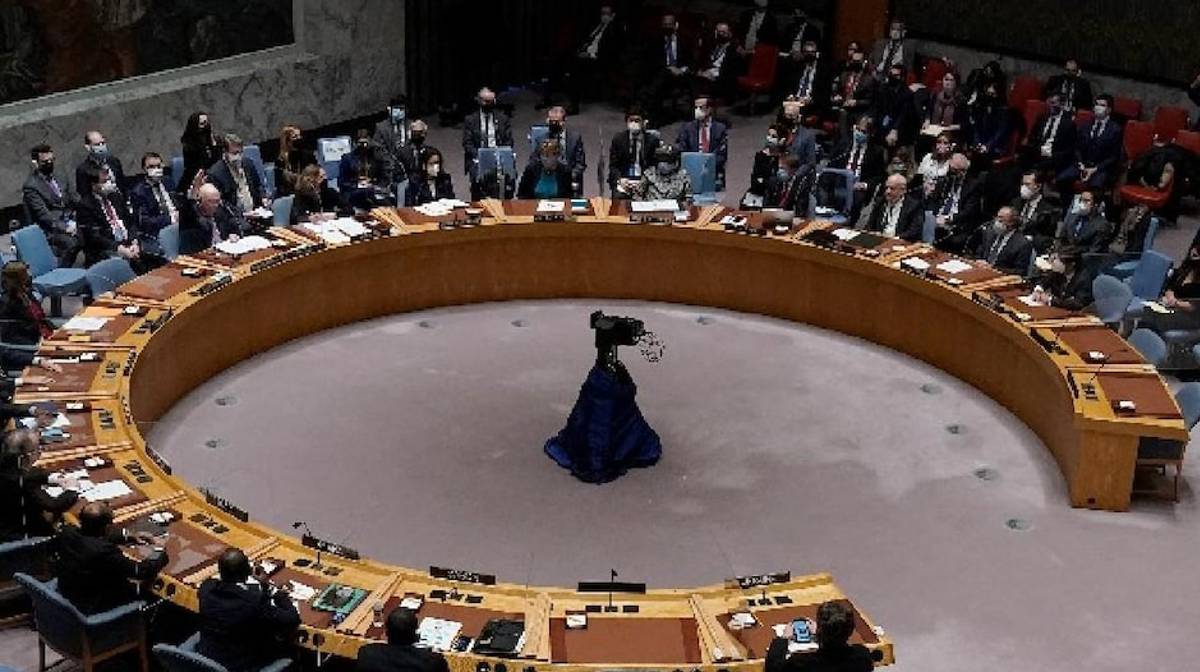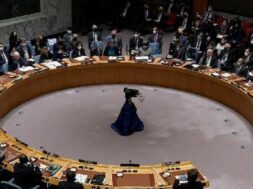
Ukraine: India Maintained Neutrality, Abstained from Voting at the UNSC
Manas Dasgupta
NEW DELHI, Feb 26: Maintaining equidistance from both Russia and the United States, India played a fine balancing act abstaining, along with China and the United Arab Emirates, from voting in the anti-Russia resolution on Ukraine sponsored by the US and Albania, in the United Nations Security Council on Saturday.
With Russia exercising its veto, the draft resolution condemning the Russian aggression on Ukraine and calling for its immediate withdrawal, met with its pre-destined fate and fell with 11 votes in favour, one against and three abstentions. The U.S. vowed to take the issue to the General Assembly, where Russia does not have a veto.
Government officials said India has been speaking to all parties including Russia and Ukraine to return to the negotiating table. Russia used its veto to kill the draft resolution supported by more than 40 other members of the General Assembly besides US and Albania. When a resolution is taken up, UNSC members have to cast their vote before any of the Permanent 5 decides to use their veto on it.
China, too, abstained. Among the non-permanent members, India’s abstention found company in the United Arab Emirates, another strong partner of the United States.
The vote at the UNSC had to be postponed twice, for an hour at a time, as U.S. and Albanian diplomats, the “penholders” of the resolution, negotiated with other countries, trying to build a consensus for the draft.
The original draft, the official sources said, was too hash against Russia calling for use of combined force against the Russian troops and was modified making it easier for India to abstain from voting. The sources said originally the sponsors of the draft had invoked UN Chapter VII, which authorises the use of force against Russian troops in Ukraine. After several rounds of heated negotiations, the U.S. agreed to soften the resolution and drop the Chapter VII reference, which is believed to have ensured that China also abstained along with India and the UAE, while Russia was alone in voting against the resolution.
Delivering India’s explanation of vote, the permanent representative T.S. Tirumurti said India was “deeply disturbed” by the developments and called for the “immediate cessation of violence.” Tirumurti said the global order had been built on the UN Charter and the respect for the territorial integrity and sovereignty of states. He called on states to respect these principles and for dialogue to settle their differences.
“Dialogue is the only answer to settling differences and disputes, however daunting that may appear at this moment. It is a matter of regret that the path of diplomacy was given up. We must return to it. For all these reasons, India has chosen to abstain on this resolution,” Tirumurti added.
The US permanent representative at the UN, Linda Thomas-Greenfield, adopted an aggressive stance in moving the resolution. “Let us never forget that this is a war of choice. Russia’s choice,” she said. “To those who say all parties are culpable, I say that is a clear cop out. One country… one country is invading another,” she said, adding that countries who based their position on Russia having a historical relationship with Ukraine should think about whom that label would apply to next. “Vote ‘no’ or abstain if you do not uphold the charter, and align yourselves with the aggressive and unprovoked actions of Russia,” she said.
During his speech, as with his other UNSC speeches relating to the Ukraine crisis, Tirumurti had said India was “deeply concerned” about the welfare of Indians in the country giving an opportunity to the Ukraine’s representative Sergiy Kyslytsya to take a shot at India. “And I may say to some: It is exactly the safety of your nationals right now in Ukraine that you should be the first to vote to stop the war – to save your nationals in Ukraine. And not to think about whether you should or should not vote because of the safety for your nationals,” he said. Kyslytsya said he was “saddened” that a “small handful of members” seemed to be “tolerating” the war.
China’s PR Zhang Jun backed diplomatic negotiations between the parties, saying, “Ukraine should become a bridge between the East and the West, not an outpost for confrontation between major powers.”
Russia’s U.N. Ambassador Vassily Nebenzia called the resolution not just anti-Russian but also anti-Ukrainian, saying the document (draft resolution) ran counter to the interests of Ukraine’s people as it sought to keep the existing government in power. With reference to Russian President Vladimir Putin asking the Ukrainian army to depose its government, Kyslytsya, addressing his Russian counterpart in the Security Council Chamber, asked, “Are you crazy?”
In post-meeting remarks to the press, U.N. Secretary-General Atonio Guterres said the meeting’s objective had not been achieved. “Today, that objective was not achieved. But we must never give up,” he said. “We must give peace another chance.”
“Ambassadors of G7 countries & UKR in Delhi met today to express their solidarity with people of UKR & to exchange information on Russia’s unjustifiable military aggression (GER currently holds G7 presidency). This is a moment to stand up for peace, rule-based order & intern law!” German ambassador Walter J Lindner tweeted.
Unofficially, several of these envoys have been conveying their concern to their Indian interlocutors about Delhi’s unwillingness to shed its neutrality over the conflict.
On Thursday, President Biden indicated that the US was in talks with India, when he was asked about Delhi’s position on the conflict. “We’re going to be — we’re in consultation with — with India today. We haven’t resolved that completely.”
Meanwhile, Russia, too, has been keeping up the pressure by lauding India’s “unbiased stand” in the Security Council. The Kremlin readout of the Modi-Putin conversation did not take note of Prime Minister Narendra Modi’s appeal to the Russian president for a “cessation of violence” and a return by all parties to dialogue.
India’s strategic ambivalence at this moment of a big turning point in world geopolitics is born out of its friendships and strategic partnerships on both sides. Russia is India’s biggest and time-tested supplier of defence weapons. Despite its growing friendship with China, Moscow has boosted India’s defence capabilities with the S-400 air defence system. Defence Minister Rajnath Singh had recently visited Moscow at the height of India’s crisis with the Chinese Army and Russia has stood behind India at the UNSC on all issues.
At the same time, India has a long-standing partnership with the United States, which includes defence pacts, trade and investment, technology, and a huge connect through the Indian diaspora and people-to-people contacts, with thousands of students leaving the country every year to study in American universities. The same with Europe. Additionally, France, which is as one of the P-5, is a vital friend of India in the UN Security Council. India needs all these friends as it deals with China’s moves at the LAC.
Within India’s foreign policy establishment, there is an ongoing debate on what India might gain or lose by its neutrality and the consequences of siding with the West. There is also the point that the West cannot afford to cut away from India at this point, as it needs India’s market, and India’s heft as a democracy for the containment of China. India’s position may have to be calibrated constantly as the situation evolves.
A joint statement after the vote read out by Thomas-Greenfield described the resolution as “vital” and “straightforward”, aimed “to hold Russia accountable for its aggression” against Ukraine. “Fundamentally, it was about whether the countries on the Security Council charged with maintaining international peace and security believe in upholding the UN Charter. Russia alone is accountable,” the statement read. “President Putin is the aggressor here. There is no middle ground,” it added.
The 43-odd sponsors of the resolution now plan to take it to the General Assembly, where, according to Ambassador Thomas-Greenfield, “the Russian veto will not apply and the nations of the world will continue to hold Russia accountable”.
On Thursday just before the voting in the UN, the US Secretary of State Anthony Blinken, speaking to Foreign Minister S Jaishankar, had stressed on the importance of a “strong collective response” to condemn what America called Russia’s “premeditated, unprovoked and unjustified attack on Ukraine.” Russia too had said it expected unequivocal support from India on its move against Ukraine in honouring the freedom of the people of the two regions suffering from Ukrainian aggression. Hours later, India stayed firm on its stand of neutrality at the UNSC vote.













